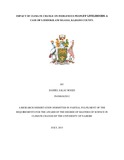Impact of climate change on indigenous peoples’ livelihoods: a case of Loodokilani Maasai, Kajiado county.

View/
Date
2015-07Author
Rogei, Daniel S
Type
ThesisLanguage
enMetadata
Show full item recordAbstract
The study on the impacts of climate change on the livelihoods of the Maasai comes at a time when
the community has been facing acute food insecurity and threatened livelihoods. It would be timely
and necessary to establish whether this trend of diminishing livelihoods and escalating poverty
could be linked to climate change and its related effect. This research was guided by use of crosssectional
survey. Both simple random and purposive sampling technique was used to select 110
respondents out of which 105 participated in the cross-sectional survey. A validated structured
questionnaire with variables on livelihoods related information was used to collect the primary
data. Data summary and classification were done using descriptive statistics from Statistical
Package for Social Sciences (SPSS) software.
The study concluded that majority of respondents in Magadi and Elang’ata Wuas were men while
the predominant age was between 18 and 24 years. The level of education showed that majority
of the respondents are illiterate followed by those with secondary education while the next largest
group is the primary school level. Majority of the respondents are livestock farmers while another
sizeable group are students. A number of respondents are employed as teachers and a similar
number is unemployed. The respondents were distributed across the two divisions of Magadi and
Elang’ata Wuas. There is huge concentration in Magadi and Kilonito because of the big livestock
markets in the two towns.
The Maasai pastoralists of Magadi and Elang’ata Wuas confirms that their lifeline is cattle farming
and pastoralism in that matter. They also confirm that they are aware of climatic changes that are
taking place and have experienced social-economic stress due to frequent droughts that have killed
their livestock. Majority of the responded have also acknowledged that besides their livestock, a
lot more other natural resources are stressed including wildlife, forests, and water sources among
others. The responded admits that they have been forced by circumstances to explore other ways
of complementing their diminishing traditional livelihoods by venturing into new areas such crop
farming, fishing, small businesses among others.
The responded unanimously allege that they have been victims of poor policies or lack of it
especially in regard to land and natural resource administration. This they say, has exacerbated an
already challenging situation and make it hard for the community to adequately adjust and cope
with the changes. This is confirmed by an extensive literature review that was carried out.
Publisher
University of Nairobi
